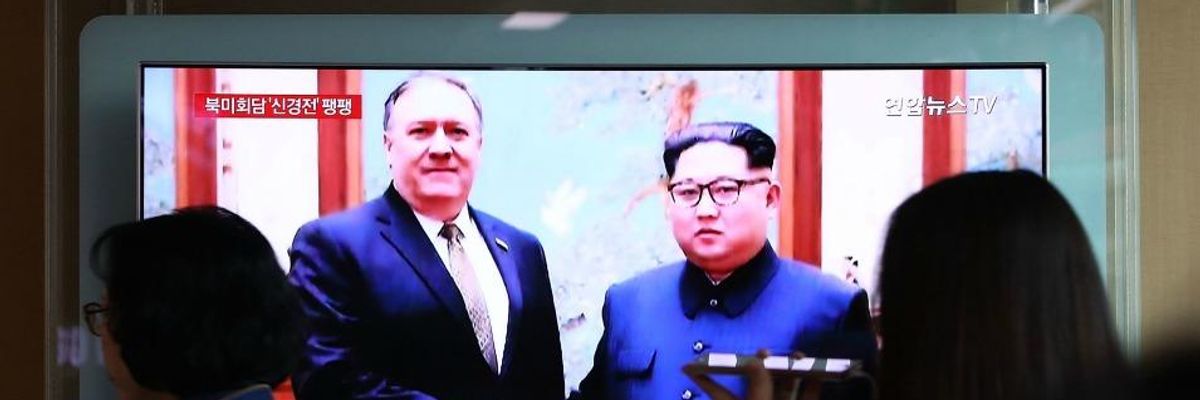North Korea's cancellation of talks planned between North and South Korea is cause for concern, as is its suggestion that the U.S.-North Korea summit scheduled for June 12 could meet the same fate. But the greater causes for concern are the U.S.-South Korea war drills and a U.S. negotiating posture that assumes immediate and unconditional denuclearization of North Korea, both of which North Korea has cited as reasons it might cancel the Trump-Kim summit.
North Korea has long maintained, understandably so, that the joint military exercises between the U.S. and South Korea are offensive in nature and amount to practice for an invasion. The so-called "Max Thunder" military exercises, a name that invokes anything but a defensive posture, began on May 11 and are expected to last for two weeks.
"North Korea has long maintained, understandably so, that the joint military exercises between the U.S. and South Korea are offensive in nature and amount to practice for an invasion."
Over 1,500 air force personnel and 100 aircraft take part in the war games, including the F-15K, the F-16, as well as the nuclear-capable B-52 and the F-22 Raptor, neither of which took part in Max Thunder last year. According to some reports, the F-22's inclusion in the exercise was apparently not meant to be public, only making the news after a South Korean citizen posted a picture online of an F-22 flying over the South Korean city of Gwangju.
What's somewhat surprising about North Korea's cancellation of the North-South talks is that Kim Jong-un changed his tone on the joint military exercises earlier this year, telling a South Korean official that he "understands that the routine joint military exercises between the Republic of Korea and the United States must continue," in the words of the official.
It's hard to know exactly what changed the calculation for Pyongyang, but the inclusion of the F-22 and B-52 in the war games was likely a factor. North Korea may have assumed that the exercises would at least not expand in scope during negotiations. These new tensions are also developing just one week after President Trump's withdrawal from the Iran nuclear agreement, which surely raised questions in North Korea about the value or lack thereof of any commitments the U.S. may make at the negotiating table. Some analysts also say North Korea's suggestion that the war games could jeopardize the Trump-Kim meeting may just be a negotiating tactic.
Regardless of the precise motivations for North Korea's change of tone, the important question for the U.S. becomes how to prevent further steps backward and continue advancing the cause of peace. The first obvious solution is to immediately and indefinitely postpone the joint military exercises between the U.S. and South Korea, though unfortunately that solution is unlikely in the short term as the Trump administration would risk the appearance of capitulating to North Korea. In the longer-term however, the U.S. and South Korea could realistically consider scaling back if not indefinitely suspending future military exercises while talks are ongoing.
Beyond scaling back or suspending the war games, the U.S. should avoid making the situation worse. So far, the brief response from the White House, explaining that it will independently verify the reports and that it will absolutely "continue to go ahead and plan the meeting with Kim Jong Un," is encouraging. But it's not hard to imagine a tweet from President Trump jumpstarting a renewed cycle of tit-for-tat threats and insults like we saw in 2017. Instead, the administration should continue to publicly reaffirm its commitment to the diplomatic process and work behind the scenes with North and South Korea to prevent such a backslide.
"Regardless of the precise motivations for North Korea's change of tone, the important question for the U.S. becomes how to prevent further steps backward and continue advancing the cause of peace."
The U.S.-South Korean summit scheduled for May 22 in Washington provides an excellent opportunity to devise a cohesive response to North Korea's concerns over war games and "one-sided" diplomacy that could preserve the planned talks and prevent further wrinkles in negotiations moving forward. Of course, it will also be a critical meeting for getting the U.S. and South Korea on the same page about the broader array of issues on the table in ongoing talks with North Korea, from denuclearization, to economic cooperation, to a peace agreement and more.
Even if the June summit moves forward, the Trump administration will need a serious attitude adjustment if they hope to make it a success. Signs from the Trump administration, namely from the leaders of its new war cabinet John Bolton and Mike Pompeo, suggest the U.S. is preparing to enter negotiations with unrealistic expectations and demands rather than the good-faith, reciprocal approach to diplomacy that's needed to bridge the gaps between the U.S. and North Korea. North Korea's explicit warning against "one-sided" demands underlines the importance of such an attitude shift.
Disturbingly though, coming to the table with one-sided demands may be the whole point. When John Bolton was serving under President George W. Bush, he was by his own admission actively working to destroy the Agreed Framework, a nuclear agreement negotiated with North Korea under the Clinton administration that froze North Korea's nuclear program for the better part of a decade. In his memoir, he remarked that the revelation that North Korea was working on technology for a uranium enrichment program (which was not explicitly prohibited by the agreement) was "the hammer I had been looking for to shatter the Agreed Framework."
Many have rightly voiced fears that the administration's plan may be to come to the table with North Korea with unrealistic, maximalist demands so that it can claim that it tried diplomacy and diplomacy failed, making it easier to build a case for war. That could be the case. It could also be the case that Trump really wants that Nobel Peace Prize, and is willing to actually negotiate in good faith to make diplomacy work. We can hope for the latter, but hope is not enough.
If the administration decides it wants a war, Congress may be all that stands in its way. Members of Congress can support diplomacy and work to prevent war with North Korea by co-sponsoring the No Unconstitutional Strike Against North Korea Act, which would prevent the president from launching preventive strikes on North Korea without congressional approval. If that sounds like a good idea, you can call your members of Congress and tell them so at 202-224-3121.




